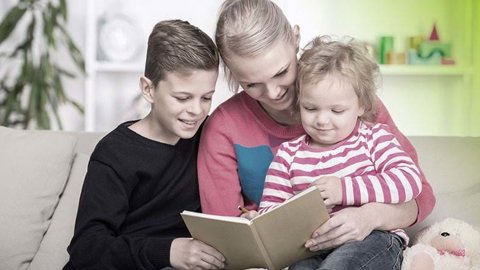Plan What You’re Going to Say Together
You don’t want to end up giving your children two different stories. You and their other parent should discuss what you’re going to tell your children before you have the conversation.
Although it will be difficult, you should try and sit down with them together so they can see that you’re both still going to be there for them no matter what.
If it’s not possible for you to talk to them together then knowing what each other is going to say will help you to stay on the same page. This will save your children any confusion and will leave them reassured that they don’t have to “pick sides” or be in the middle of your separation.
Where appropriate, you should make sure that your children know that neither one of their parents is “bad” and that they don’t need to choose whose side they’re on. You should continue to be respectful of your former partner when talking about them and the separation, as any issues between you and your former partner should remain between the two of you and shouldn’t involve your children at all.
Additionally, you should try to make sure that your children know that the decision to separate is nothing to do with them or their behaviour. You can try to do this by explaining that although your relationship with your former partner forms part of the family dynamic, the decision to separate only relates to you and your former partner – not the children. Reassure them that their relationship with you and your former partner isn’t going to change.
Be Honest
The likelihood is that your child is probably going to have a lot of questions and it’s important to answer them as truthfully as you can.
You can still set boundaries as your children don’t need to know every detail of what will be mostly adult issues, taking into account their age and level of understanding and maturity. However, this doesn’t mean that you should just make things up just to make the conversation easier for you.
You might think it’s reassuring to promise that things will stay the same but at the end of the day, you don’t want your children to resent you if this doesn’t turn out to be the case six months later.
Similarly, if you don’t know the answer to something, you can simply explain that you’re unsure but reassure them that you will let them know as soon as you can.
Listen To Your Children
Just like everyone else, children can get angry and upset. Due to this, they may blame a situation on themselves. It’s important to show them and tell them that their feelings are valid in addition to reassuring them that you understand why they may be feeling that way. Let them express their emotions how you’d like to express yours.
Additionally, if they need space then give them space. You don’t have to try to cover everything in just one conversation and if they decide that they have questions later on then you should hear them out and answer them at that stage instead when they’re ready and when they’ve had time to process everything. After all, it’s a lot of information to take in all at once, especially for a child, so you may need to wait for your child to be ready to discuss things further once they’ve had that time to process and understand everything that’s happening.
You can also try and allow them to share what they would like to happen in the future. This doesn’t mean that you’re letting them make your decisions for you, but it’s important to show your children that you’re letting them have some input into their future. This will help them to feel empowered and positive about the future, instead of feeling like it’s something new and scary which is out of their control.
Don’t Be Negative About Your Former Partner
It’s very important that you don’t put your child in a position where they think they need to pick sides between their parents. You and your child’s other parent may have your differences, but playing the blame game won’t help anyone.
Your child’s wellbeing is the most important thing and letting them process their own emotions is important. They should be shielded from any adult emotions that may conflict with their own. You can explain to them that you’re upset with something that their other parent did while also explaining that what they did doesn’t make them a bad person or doesn’t mean that the other parent doesn’t love them the same.
You could even take the opportunity to explain to your child how a person’s actions and their personality can be completely separate. For example, a ‘good’ person can do something which may hurt another person and it might actually be that they didn’t intend to cause that hurt in the first place. Mistakes and miscommunications happen as nobody is perfect so introducing your child to this concept can be good for their development going forward. It can also help them to make sense of the separation and your new type of relationship with their other parent going forward.
Showing your children that both parents love them, even if you don’t feel the same way towards each other anymore will allow them to feel safe and protected by both of you.
Be Open About Your Plans For The Future
Children live in their own bubbles and things that may not be on the forefront of your mind might very well be playing on theirs. Consider what they might want to know, like who is going to take them to school and on what days you’re both going to see them.
If you don’t have all the answers yet then you can simply let them know that you’re going to make a plan soon. Listening to your children’s questions might even help you to leave no stone unturned when making future child care plans with your former partner.
Most of all, try and take a step back in order to consider what your child is likely to want, need and how that can be sorted out. It may mean you having to think more about your child’s needs than your own and that is hard to do at such a difficult time in your life. But by achieving what is in your child’s best interests, they’ll be much happier for it and you will be too.
If you and your former partner can’t agree on childcare arrangements, our Divorce and Family Law Solicitors can help you. We understand that any relationship breakdown is difficult but choosing the right Divorce Solicitor to help you could help to reduce any conflict and improve the outcome for you.
At Simpson Millar, we always handle each case with the sensitivity it deserves and will tailor our service to your unique circumstances to reach the best outcome for your child. We can talk you through mediation or a Child Arrangement Order so that you can start planning your future and so that you will be able to reassure your children as soon as possible.
For initial advice get in touch with our Family and Child Law Solicitors who will be happy to assist you. Our expert team can be contacted on 0808 239 3465 or alternatively you can request a call back.









